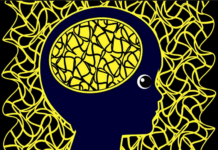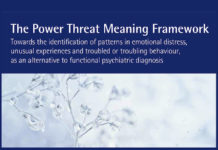How Does Mindfulness Work?
A new study explores how mindfulness impacts self-compassion and meaning in life to increase mental health and wellbeing.
Case Study of Liberation Approach to International Mental Health Care
Study in Brazil demonstrates how the exploration of contextual determinants of distress in mental health care can inform therapeutic change.
Opening Doors in the Borderlands: An Interview with Liberation Psychologist Mary Watkins
MIA’s Micah Ingle interviews Mary Watkins about reorienting psychology toward liberation and social justice.
Experiences of Depression Connected to Declining Sense of Purpose
In-depth interviews find that those who screened positive for depression did not explain their experience in terms of diagnostic symptoms.
What is the Evidence for Empirically Supported Treatments in Psychology?
New meta-scientific review questions the evidence for the gold standard psychotherapies and empirically supported treatments.
Why is the Field of Psychotherapy Still Fractured into Different Approaches?
Psychotherapy is dominated by contradicting schools of thought, exhibits a gap between research and practice, and repackages old ideas rather than finding clinical consensus.
D-Cycloserine Supplement Does Not Add Much to Exposure Therapy
A closer look at a new study reporting that the supplement D-cycloserine improved anxiety when used with exposure therapy.
Psychotherapy Less Effective for People in Poverty and Those on Antidepressants
A new study finds poorer depression and anxiety outcomes in psychotherapy for people in economically deprived neighborhoods and those on antidepressants.
How to Integrate Culture into Mental Health Care
Researchers explore how culturally responsive services can create greater equity in mental health care.
Climate Change, Mental Health and Collective Action: An Interview with Jennifer Freeman
In an interview with MIA's Akansha Vaswani, narrative therapist Jennifer Freeman calls for a shift away from individualistic approaches to 'eco-anxiety' and toward responses that connect us all to a counter-tsunami of action for the planet.
Clinical Guidelines for Depression Need Urgent Revision
A coalition of 35 health organizations expressed serious concerns that the NICE guideline for adult depression may cause clinical harm—they demand “full and proper” revisions.
A Biopsychosocial Model Beyond the Mind-Body Split
Can a renewed biopsychosocial approach, grounded in an updated philosophy, foster person-centered medicine, and psychiatry?
How to Involve Youth in Their Own Mental Health Care
Clinicians play a key role in empowering adolescents and their parents to make decisions about their mental health treatment.
Therapy Gets More Effective Over Time While Antidepressants Decrease in Effectiveness
New review of long-term depression data finds psychotherapy more effective over time whereas antidepressants decrease in effectiveness.
How Psychological Injuries Cause Physical Illness—And How Therapy Can Heal It
How does experiencing physical abuse as an 8 year old shorten one's lifespan? How do insulting words turn into diabetes? Or sexual abuse trigger a heart attack 50 years in the future? Emotional wounds can damage DNA and produce a huge web of destructive effects, but therapy can turn the process around.
Two Roads Diverged in a Yellow Wood: A Tale of Psychotherapy
Two roads diverged in a yellow wood, and not knowing which one to take, I stood straight, watching my life pass me by. But in therapy, I began to feel the knots of my life come alive inside me. The point is not just to talk, it is to feel your story inside, to hear your silences, and to realize who you are… and who you can be.
An Open Letter to Howard Stern, the “Poster Boy for Psychotherapy”
Dear Howard Stern: What may come as a surprise to you is that the quality of talk therapy that was available to you—time-intensive, in-depth sharing of feelings, exploring childhood traumas, examining and changing difficult personality traits—is steadily becoming unavailable to the average American.
Reflections on 25,000 Hours of Being With People in Extreme States
Being with someone in an extreme state or other emotional pain, it feels like we’re two young friends who have ridden our bikes to a quiet place by the river and my friend turns to tell me about awful things happening at home — and they cry or yell in anger while I sit there and wonder what to say or do, and realize that just being quiet is okay.
Fighting for the Meaning of Madness: An Interview with Dr. John Read
Akansha Vaswani interviews Dr. John Read about the influences on his work and his research on madness, psychosis, and the mental health industry.
The Power Threat Meaning Framework One Year On
The team that developed the Power Threat Meaning framework as a diagnostic alternative reflects on the response to the framework after one year.
On Whose Authority?
The problem with authoritarianism is that it shuts down the possibility of ordinary people (that’s all of us) creating anything new. Can therapists give up our addiction to knowing what’s “the right path,” what’s the “smart” answer, what’s the solution to the problem, in favor of supporting our clients to create new ways of building their lives?
The Role of Intergenerational Trauma in the Perpetuation of Childhood Maltreatment
A new study examines the role parent borderline pathology plays in the perpetuation of childhood maltreatment.
Constructing Alternatives to the DSM: An Interview with Dr. Jonathan Raskin
Dr. Raskin discusses psychotherapists’ dissatisfaction with current psychiatric diagnostic systems and explores alternatives.
Psychosocially Oriented Psychologists Struggle Against the Medical Model
Interviews with psychosocially oriented psychologists demonstrate their experiences of discomfort with the hegemony of the medical model in their place of work and the conflicts that arise when they attempt to provide alternatives.
Mental Health Recovery Narratives Play Central Role in Trauma-Informed Care
New research synthesizes insights from 45 studies to construct a conceptual framework relating different elements of recovery narratives to trauma-informed approaches to care.

































